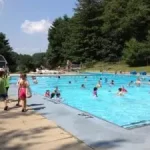ADA Compliance for Public Vs. Private Pools
August 7, 2015
There is often a lot of confusion surrounding the subject of pool lift laws in public areas versus private residences. The misperception is that all pools require a pool lift, however, the ADA requires accessible entry in municipal pools, schools pools, government-owned, hotels, or any pool in general that caters to the public and promotes public recreation.
Public Pools
In the 2010 ADA Standards, recreational facilities, like gymnasiums and hotels, joined the list of ADA-compliant organizations. The ultimate goal is to accommodate those with disabilities, providing them with an accessible entry into a swimming pool—whether this means installing a fixed pool lift or a sloped entrance, or means of entry.
With the 2010 regulations, new or altered pools are required to have at least one means of entry and exit. Some pools may require two, for example, larger pools. To comply with ADA standards for large public swimming pools, a pool lift or sloped entry must be installed with another means of entry being a transfer system or pool stairs.
Public wade pools and spas are not omitted in this category. Public spas must also comply with the ADA standards, with either a lift, transfer system, or transfer wall.
Private Pools
What signifies a private swimming facility? Understandably the ADA does not require pool lifts for home pools in private residences because these pools are not open to the general public, however private residence pools are not the only private pools that do not have to comply. Some swim clubs and country clubs may not be subject to the laws because they may have selective membership standards or rent to members only. While some swim meets may take place in these facilities, if they are closed to the public, they do not have to comply.
Neighborhood pools protected by the Home Owners Association do not have to comply with ADA pool lift laws, as well, though once these pools are open to the public, the law takes effect. Any swim meets must be limited to family and friends, and closed to the public in order to the avoid compliance.
The gray area between these two types of facilities can make ADA compliance difficult to understand. To break it down, public swimming pools that are open to the public with memberships to anyone, rents to public groups, offers swim lessons to non-members, and hosts swim meets publicly must comply with the ADA regulations. While not all private swimming facilities are omitted from the laws, most facilities with a selective membership, membership lessons, and closed swim meets do not have to install a pool lift or other means of accessibility.


